
Digital cinema refers to the adoption of digital technology within the film industry to distribute or project motion pictures as opposed to the historical use of reels of motion picture film, such as 35 mm film. Whereas film reels have to be shipped to movie theaters, a digital movie can be distributed to cinemas in a number of ways: over the Internet or dedicated satellite links, or by sending hard drives or optical discs such as Blu-ray discs.
A feature film or feature-length film, also called a theatrical film, is a narrative film with a running time long enough to be considered the principal or sole presentation in a commercial entertainment program. The term feature film originally referred to the main, full-length film in a cinema program that included a short film and often a newsreel. Matinee programs, especially in the US and Canada, in general, also included cartoons, at least one weekly serial and, typically, a second feature-length film on weekends.

An independent film, independent movie, indie film, or indie movie is a feature film or short film that is produced outside the major film studio system in addition to being produced and distributed by independent entertainment companies. Independent films are sometimes distinguishable by their content and style and how the filmmakers' artistic vision is realized. Sometimes, independent films are made with considerably lower budgets than major studio films.
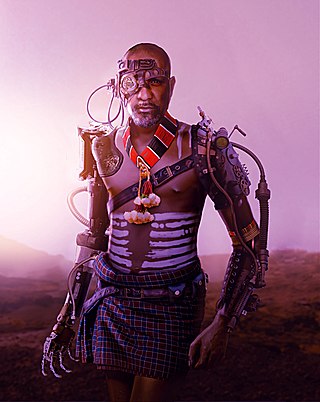
Afrofuturism is a cultural aesthetic, philosophy of science, and history that explores the intersection of the African diaspora culture with science and technology. It addresses themes and concerns of the African diaspora through technoculture and speculative fiction, encompassing a range of media and artists with a shared interest in envisioning black futures that stem from Afro-diasporic experiences. While Afrofuturism is most commonly associated with science fiction, it can also encompass other speculative genres such as fantasy, alternate history and magic realism. The term was coined by American cultural critic Mark Dery in 1993 and explored in the late 1990s through conversations led by Alondra Nelson.
A mobile cinema is a cinema on wheels.
Third Cinema is a Latin American film movement that started in the 1960s–70s which decries neocolonialism, the capitalist system, and the Hollywood model of cinema as mere entertainment to make money. The term was coined in the manifesto Hacia un tercer cine, written in the late 1960s by Argentine filmmakers Fernando Solanas and Octavio Getino, members of the Grupo Cine Liberación and published in 1969 in the journal Tricontinental by the OSPAAAL.
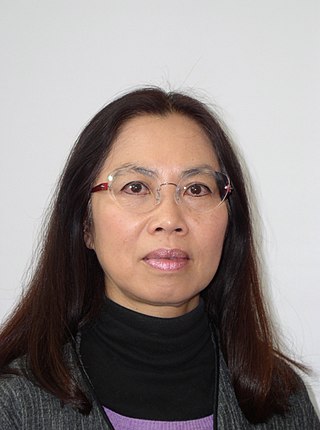
Trinh T. Minh-ha is a Vietnamese filmmaker, writer, literary theorist, composer, and professor. She has been making films for over thirty years and may be best known for her films Reassemblage, made in 1982, and Surname Viet Given Name Nam, made in 1985. She has received several awards and grants, including the American Film Institute's National Independent Filmmaker Maya Deren Award, and Fellowships from the John Simon Guggenheim Foundation, the National Endowment for the Arts and the California Arts Council. Her films have been the subject of twenty retrospectives.
Technoculture is a neologism that is not in standard dictionaries but that has some popularity in academia, popularized by editors Constance Penley and Andrew Ross in a book of essays bearing that title. It refers to the interactions between, and politics of, technology and culture.
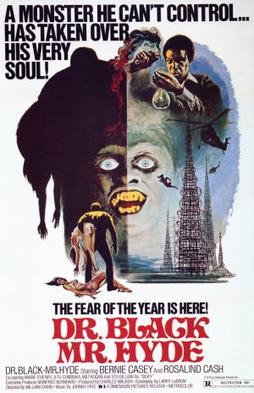
Dr. Black, Mr. Hyde is a 1976 blaxploitation horror film loosely inspired by the 1886 novella Strange Case of Dr. Jekyll and Mr. Hyde by Robert Louis Stevenson. The film stars Bernie Casey and Rosalind Cash, and was directed by William Crain. Along with Crain, and it was written by Larry LeBron and Lawrence Woolner with cinematography by Tak Fujimoto. It was filmed primarily in Los Angeles, at locations such as the Watts Towers.
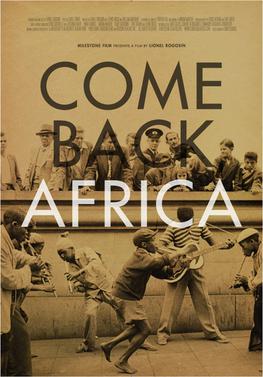
Come Back, Africa is a 1959 film, the second feature-length film written, produced, and directed by American independent filmmaker Lionel Rogosin. The film had a profound effect on African cinema, and remains historically and cultural importance as a document preserving the heritage of the townships in South Africa in the 1950s. It may be classified as reportage, documentary, historical movie or political cinema, since it portrays real events and people. It reveals an interpretation of meaningful social facts and a strong ethical assumption towards human behaviours like racism.
The Iranian film director Abbas Kiarostami is known for uses of certain themes and cinematic techniques that are instantly recognizable in his work, from the use of child protagonists and stories that take place in rural villages, to conversations that unfold inside cars utilizing stationary mounted cameras. He often undertook a documentary style of filmmaking within narrative works, and frequently employs contemporary Iranian poetry in dialogue, movie titles, and in the thematic elements of his pictures.

Leonard Lipton was an American author, filmmaker, lyricist and inventor. At age 19, Lipton wrote the poem that became the basis for the lyrics to the song "Puff, the Magic Dragon". He wrote books on independent filmmaking and become a pioneer in the field of projected three-dimensional imagery. Leonard Lipton developed 3D cinema technology that is used in RealD 3D cinemas. His technology is used to show 3D films on more than 30,000 theater screens worldwide.

Afro-Punk (2003) is a 66-minute documentary film directed by James Spooner and produced by Matthew Morgan, exploring the roles of African Americans within what was then an overwhelmingly white punk scene across the United States of America—and taking place as the world shifted with the galvanizing power of the internet. The film focuses on the lives of four African Americans dedicated to the punk rock lifestyle, interspersed with interviews from scores of black punk rockers from all over the United States. Fans of the film and the music inspired an alternative movement, that later became the annual Afropunk Festival beginning in 2005.
SIGNIS (official name: World Catholic Association for Communication) is a Roman Catholic lay ecclesial movement for professionals in the communication media, including press, radio, television, cinema, video, media education, internet, and new technology. It is a non-profit organization with representation from over 100 countries. It was formed in November 2001 by the merger of International Catholic Organization for Cinema and Audiovisual (OCIC) and International Catholic Association for Radio and Television (Unda). At its World Congress in Quebec in 2017, SIGNIS welcomed also former member organisations of the International Catholic Union of the Press (UCIP).

Buud Yam is a 1997 Burkinabé historical drama film written and directed by Gaston Kaboré. It is the sequel to the film Wend Kuuni. As of 2001, it was the most popular African film ever in Burkina Faso.
Documentary practice is the process of creating documentary projects. It refers to what people do with media devices, content, form, and production strategies in order to address the creative, ethical, and conceptual problems and choices that arise as they make documentary films or other similar presentations based on fact or reality. Colleges and universities offer courses and programs in documentary practice.
Afro-Iraqis are Iraqi people of African Zanj heritage. Historically, their population has concentrated in the southern port city of Basra, as Basra was the capital of the slave trade in Iraq. Afro-Iraqis speak Arabic and mostly adhere to Islam. Some Afro-Iraqis can still speak Swahili along with Arabic.

A film – also called a movie, motion picture, moving picture, picture, photoplay or (slang) flick – is a work of visual art that simulates experiences and otherwise communicates ideas, stories, perceptions, feelings, beauty, or atmosphere through the use of moving images. These images are generally accompanied by sound and, more rarely, other sensory stimulations. The word "cinema", short for cinematography, is often used to refer to filmmaking and the film industry, and the art form that is the result of it.
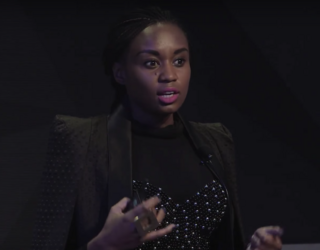
Wanuri Kahiu is a Kenyan film director, producer, and author. She is considered to be “one of Africa's most aspiring directors, being part of a new, vibrant crop of talents representing contemporary African culture”. She has received several awards and nominations for the films which she directed, including the awards for Best Director, Best Screenplay and Best Picture at the Africa Movie Academy Awards in 2009 for her dramatic feature film From a Whisper. She is also the co-founder of AFROBUBBLEGUM, a media collective dedicated to supporting African art for its own sake.
N'Diagne Adechoubou is a Beninese film director and producer.










